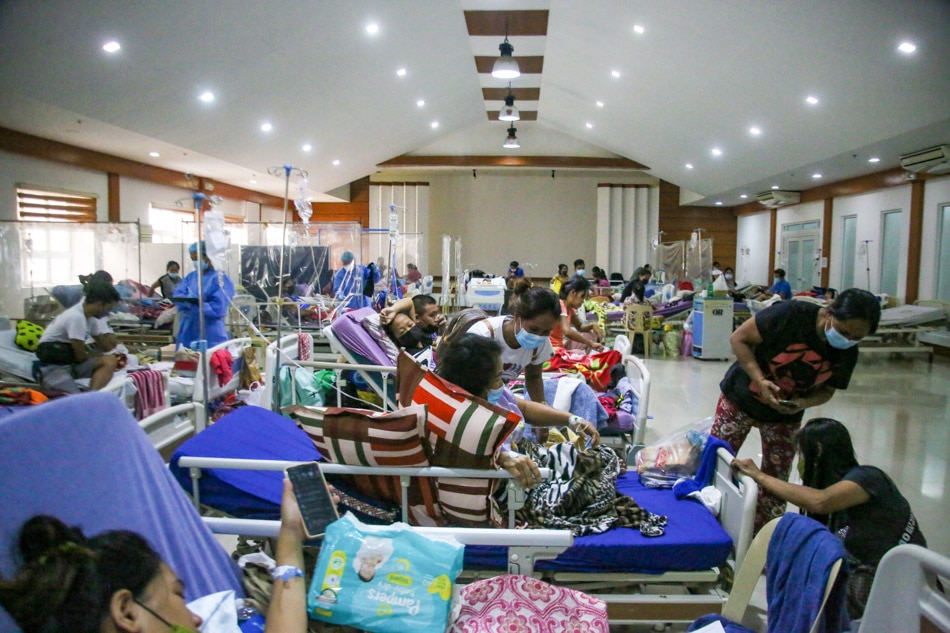Filipino patients shoulder 34 to 44 pct of their hospital expenses, says PhilHealth | ABS-CBN
ADVERTISEMENT

Welcome, Kapamilya! We use cookies to improve your browsing experience. Continuing to use this site means you agree to our use of cookies. Tell me more!
Filipino patients shoulder 34 to 44 pct of their hospital expenses, says PhilHealth
Sherrie Ann Torres,
ABS-CBN News
Published Oct 05, 2022 08:05 PM PHT
MANILA — Filipinos getting hospitalized pay 34 to 44.7 percent of their bill from their own pockets, according to the 2019 data gathered by the Philippine Health Insurance Corporation (PhilHealth).
MANILA — Filipinos getting hospitalized pay 34 to 44.7 percent of their bill from their own pockets, according to the 2019 data gathered by the Philippine Health Insurance Corporation (PhilHealth).
PhilHealth OIC president and CEO Eli Dino Santos told the Senate Committee on Government Corporations and Public Enterprises that based on their 2019 study, a regular patient shoulders at least 34 percent of his total hospital expenses.
PhilHealth OIC president and CEO Eli Dino Santos told the Senate Committee on Government Corporations and Public Enterprises that based on their 2019 study, a regular patient shoulders at least 34 percent of his total hospital expenses.
“Meaning, for every P1 spending, the out-of-pocket is 34 centavos,” Santos said.
“Meaning, for every P1 spending, the out-of-pocket is 34 centavos,” Santos said.
A similar study conducted by the Philippine Statistics Authority for year 2019 has indicated a higher out-of-pocket expense at 44.7 percent, said Santos.
A similar study conducted by the Philippine Statistics Authority for year 2019 has indicated a higher out-of-pocket expense at 44.7 percent, said Santos.
ADVERTISEMENT
“I hope mechanisms are being made to address this out-of-pocket expenses to lower within the acceptable limit,” Sen. Joel Villanueva told Santos.
“I hope mechanisms are being made to address this out-of-pocket expenses to lower within the acceptable limit,” Sen. Joel Villanueva told Santos.
Sen. Alan Peter Cayetano said there are more rich and middle class people who use PhilHealth benefits as compared to the indigent.
Sen. Alan Peter Cayetano said there are more rich and middle class people who use PhilHealth benefits as compared to the indigent.
The reason, he said, is that majority of those in the poor section of society are not aware that they are PhilHealth members.
The reason, he said, is that majority of those in the poor section of society are not aware that they are PhilHealth members.
“Based on the (OCTA Research) survey, 57 percent would say hindi ako miyembro ng PhilHealth. Bakit kasi hinahanapan n'yo pa ng ID?” Cayetano asked.
“Based on the (OCTA Research) survey, 57 percent would say hindi ako miyembro ng PhilHealth. Bakit kasi hinahanapan n'yo pa ng ID?” Cayetano asked.
Santos said the move is because only 90 percent of Filipinos are registered in the PhilHealth system.
Santos said the move is because only 90 percent of Filipinos are registered in the PhilHealth system.
ADVERTISEMENT
“In terms of practical terms, it has to be much easier… We have to have a better way,” Cayetano said.
“In terms of practical terms, it has to be much easier… We have to have a better way,” Cayetano said.
PhilHealth requires its members to pay 4 percent, provided that they earn P10,000 to P80,000 per month.
PhilHealth requires its members to pay 4 percent, provided that they earn P10,000 to P80,000 per month.
The monthly contribution runs from P400 to P3,200.
The monthly contribution runs from P400 to P3,200.
For next year, PhilHealth is asking for a P100.233 billion government subsidy.
For next year, PhilHealth is asking for a P100.233 billion government subsidy.
At the hearing, Santos said PhilHealth’s finances remain stable and sound, contrary to reports that the agency’s coffers are already drying up.
At the hearing, Santos said PhilHealth’s finances remain stable and sound, contrary to reports that the agency’s coffers are already drying up.
ADVERTISEMENT
Aside from their member’s monthly contribution, PhilHealth also receives funding from the Philippine Charity Sweepstakes Office (PCSO) and the Philippine Amusement and Gaming Corporation (PAGCOR).
Aside from their member’s monthly contribution, PhilHealth also receives funding from the Philippine Charity Sweepstakes Office (PCSO) and the Philippine Amusement and Gaming Corporation (PAGCOR).
"It is in our hands, there’s no limit in the lifespan of PhilHealth right now. Again, PhilHealth is here to stay," Santos said.
"It is in our hands, there’s no limit in the lifespan of PhilHealth right now. Again, PhilHealth is here to stay," Santos said.
Both the Private Hospital Association of the Philippines, Inc (PHAPI) and the National Nurses Association meantime stressed that PhilHealth still owes various health facilities billions of pesos.
Both the Private Hospital Association of the Philippines, Inc (PHAPI) and the National Nurses Association meantime stressed that PhilHealth still owes various health facilities billions of pesos.
The agency’s delayed payment, they said, result to delayed payment of healthcare workers’ monthly salaries, overtime, allowances and other benefits, prompting many HCWs to resign and try their luck in other countries.
The agency’s delayed payment, they said, result to delayed payment of healthcare workers’ monthly salaries, overtime, allowances and other benefits, prompting many HCWs to resign and try their luck in other countries.
RELATED VIDEO
Read More:
Senate
senator
PhilHealth
hospital
insurance
Philippine Health Insurance Corporation
hospital expense
Eli Dino Santos
Joel Villanueva
Alan Peter Cayetano
ADVERTISEMENT
ADVERTISEMENT



